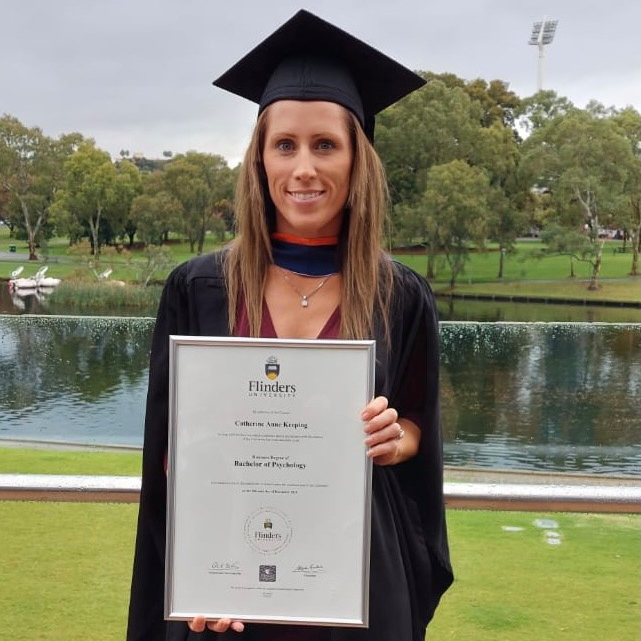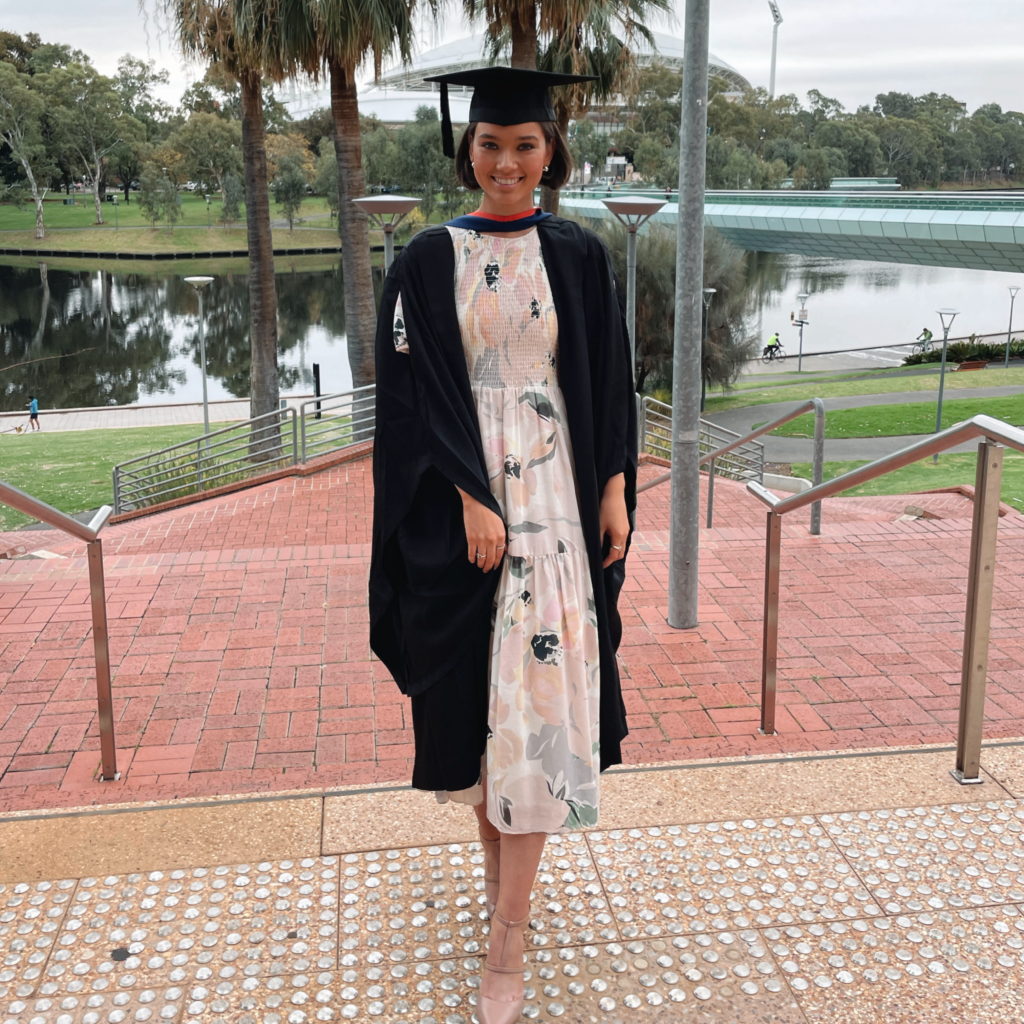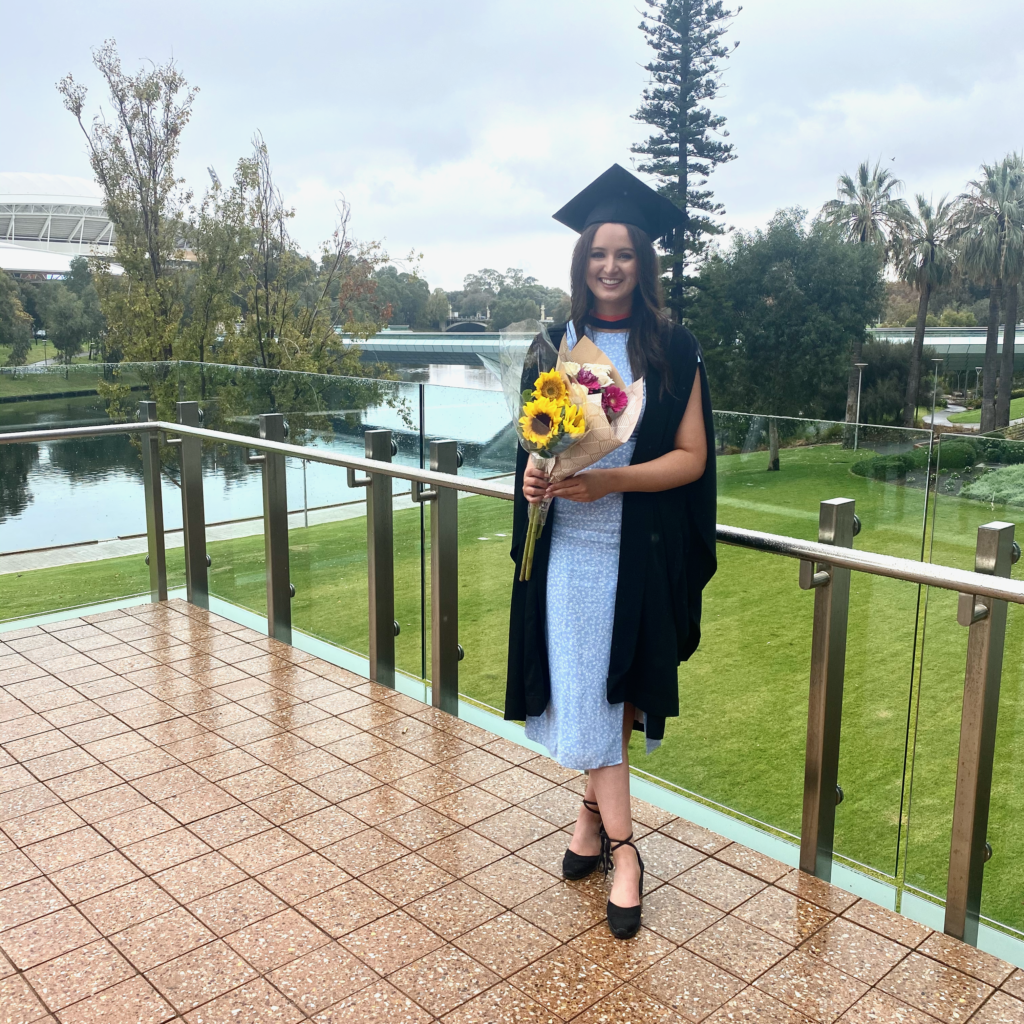The Takarangi Lab welcomes three new post-graduate students in 2021: Catherine Keeping, Erin Simister, and Nadine Stirling. All three students completed their Honours year of the Bachelor of Psychology (Honours) in our lab in 2020, under the supervision of Dr Melanie Takarangi.
Uniquely, all three post-graduate students have started different programs. In 2021, Catherine begins her Master of Psychology (Clinical), Erin starts her Doctor of Philosophy (Clinical Psychology) program, and Nadine begins her Doctor of Philosophy (PhD) in Psychology.
We asked Catherine, Erin, and Nadine some questions about how they felt about getting into their respective programs. Read below for their take on being accepted into a postgraduate psychology program.
Catherine

How do you feel about getting into the program?
I feel excited and honoured to have been accepted into the Master of Clinical Psychology programme at Flinders University. It is a huge achievement, and I am eager to continue developing my research and clinical skills over the next 2 years.
How do you feel about working in the Takarangi lab for the next 3 to 4 years?
I am ecstatic that I am able to remain working in the Takarangi lab over the next 2 years. I feel incredibly lucky for the opportunity to continue working in such a collaborative, supportive environment and learning from Melanie Takarangi and everyone in the Takarangi Lab
What are you most looking forward to?
I am really looking forward to developing my clinical expertise through coursework and placement and gaining some hands-on experience, though I also really enjoy research so am equally excited about undertaking another research project.
What are you apprehensive about?
I have two children and found balancing coursework and thesis in honours with family life challenging, so I am most apprehensive about now also having to balance placement.
What are your top tips for maintaining a health work-life balance?
I am actually a bit of a workaholic and am still figuring out how to maintain a healthy study-life balance; however, my top tips for maintaining a healthy study-life balance are to plan and schedule study hours and goals for each day and minimise distractions during study/work time. Most importantly, prioritise self-care—both physically and emotionally— and to ask for help when you need it.
Erin

How do you feel about getting into the program?
I feel very lucky and honoured to have been accepted into the Doctor of Philosophy (Clinical Psychology) program at Flinders University. I recognise the significance of this achievement and am excited to see where it takes me over the next 4 years and in life more generally.
How do you feel about working in the Takarangi lab for the next 3 to 4 years?
I am thrilled to continue working in the Takarangi lab. The collaborative and supportive nature of the lab was a highlight of my honours year and continues to be one of my greatest assets as a researcher. I look forward to stepping into mentorship roles in the coming years and helping other students in our lab achieve their own academic goals.
What are you most looking forward to?
I am most looking forward to contributing to research knowledge and hopefully (in the not-so-distant future) travelling interstate and overseas with the Takarangi lab to present my research at conferences. I am also excited (and nervous) to begin clinical placements early next year.
What are you apprehensive about?
I am most apprehensive about the challenges that come with balancing clinical coursework, placements and thesis research. I can get stressed when I feel like work is building up, so I will need to manage my time well and ask for support when needed. I find solace in knowing that it is indeed possible as I have watched others graduate from the same program and go on to excel in their respective careers.
What are your top tips for maintaining a health work-life balance?
I find it really helpful to structure my week in advance, with time set aside for self-care, exercise and seeing friends etc. outside of study hours. If it’s in my (paper – yes paper) diary then it feels like an ‘event’ rather than an afterthought. Though, to be honest, I am still working it out and I think it’s important to acknowledge that we won’t always have the study-life balance ‘right’ (if there is such a thing).
Nadine

How do you feel about getting into the program?
I feel incredibly grateful to have been accepted into the Doctor of Philosophy program at Flinders University.
How do you feel about working in the Takarangi lab for the next 3 to 4 years?
I am excited to continue my work with the Takarangi lab over the next few years. I feel honoured to be part of such a supportive and collaborative lab that encourages you to be the best you can be.
What are you most looking forward to?
I am most looking forward to developing my research and gaining teaching experience through tutoring and marking. I am also excited to present at conferences – hopefully overseas in the near future.
What are you apprehensive about?
I am most apprehensive about balancing my research with other skill-development opportunities, such as tutoring, and more generally, maintaining a good work-life balance.
What are your top tips for maintaining a health work-life balance?
I like to write down all my tasks at the start of the week across four areas: university, work, volunteering, and personal, and fill in my diary with those tasks. I find this helps me balance the different areas of my life and shows me where I have free time for breaks throughout the week. I think it’s also really important to set short and long-term goals for yourself (professional and personal), so you know what you’re working towards, as well as ask for support when you need it.
Everyone in the Takarangi Lab is excited to have these amazing new additions to our research team. Watch this space for more from these up-and-coming researchers!
“I am really looking forward to developing my clinical expertise…”
Catherine Keeping, 2021
“I am thrilled to continue working in the Takarangi Lab.”
Erin Simister, 2021
“I am most looking forward to developing my research…”
Nadine Stirling, 2021